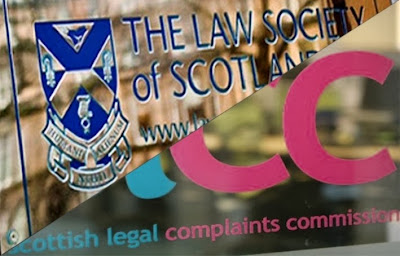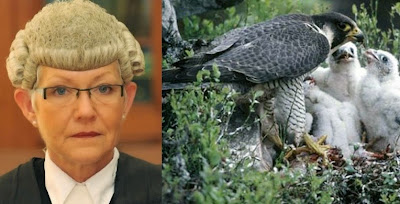 Lawyers regulator suggests three years to complain about a crooked lawyer. FIVE YEARS on from the creation of an ‘independent’ regulator to take the sting out of lawyers dealing with their own complaints, the Scottish Legal Complaints Commission (SLCC) has launched a consultation on rules changes which also contains a proposal to raise the current, and controversial one year time bar on client complaints against rogue lawyers to three years.
Lawyers regulator suggests three years to complain about a crooked lawyer. FIVE YEARS on from the creation of an ‘independent’ regulator to take the sting out of lawyers dealing with their own complaints, the Scottish Legal Complaints Commission (SLCC) has launched a consultation on rules changes which also contains a proposal to raise the current, and controversial one year time bar on client complaints against rogue lawyers to three years.
The consultation will close on November 17th 2014. Anyone wishing to respond to the consultation should contact the Scottish Legal Complaints Commission via contact information provided in the letter sent out by the SLCC: David.Buchanan-Cook@scottishlegalcomplaints.org.uk or enquiries@scottishlegalcomplaints.org.uk
Any changes to the rules can only be enacted once approved by Scotland’s top judge, the Lord President, Lord Brian Gill - who is currently waging a war against calls for judges to loosen their grip on their own complaints system – dubbed “Window Dressing” by Scotland's first Judicial Complaints Reviewer, Moi Ali.
 SLCC Rules Change Consultation October 2014:
SLCC Rules Change Consultation October 2014:
The SLCC has launched a consultation on a number of proposed changes to our Rules.
There are a number of reasons why our Rules need to be reviewed.
Firstly, with the exception of some clarification around the time bar provisions and the removal of the requirement for a draft determination decision, the Rules have not been reviewed since 2009. With the benefit of five years’ operating experience, we are taking the opportunity to ensure that our Rules are fit for purpose. In particular, we are including sections relating to oral hearings and handling complaints which have not previously been part of our Rules.
Secondly, there have been changes made to the Legal Profession and Legal Aid (Scotland) Act 2007. A stakeholder group made up of consumer interest groups and the relevant professional organisations wrote to the Scottish Government in Autumn 2013 to suggest changes which it was agreed would improve the 2007 Act. The Scottish Government conducted a further consultation on these proposals which were subsequently approved by the Justice Committee of the Scottish Parliament in August 2014. These changes have an enactment date of 1 January 2015 and some of them require to be reflected in the Rules. A link to the relevant Justice Committee papers is below, since these provide fuller background on the changes.
Thirdly, the Commission proposes to change the time bar provisions. Additional detail is set out in the attached document and the proposal is that the Commission moves from a one year to a three year time bar. A comparison with time bars operated by other professional bodies and an analysis of the high number of complaints currently excluded by the time bar are strong arguments for change. The proposal aims to encourage swift and transparent complaint handling by practitioners in the first instance. It introduces a shorter six month time limit where the practitioner makes it clear to the complainer that they will take no further action on a complaint and provides details of how a complaint may be raised with the Commission.
Under section 32 (5) of the Legal Profession and Legal Aid (Scotland) Act 2007, the Commission must, before varying its rules, consult with the Lord President of the Court of Session; the Scottish Ministers; the relevant professional organisations; such groups of persons representing consumer interests as it considers appropriate, as to the proposed content of the rules to be varied.
The SLCC’s latest attempt to redefine itself as less of an anti-client regulator comes after several changes in the SLCC's powers in the Scottish Legal Complaints Commission (Modification of Duties and Powers) Regulations 2014 – among which awarded solicitors involved in conduct complaints a new right to complain about the manner in which the complaint was dealt with by the relevant professional organisation.
The earlier changes were promoted by Cabinet Secretary for Justice Kenny MacAskill at the Scottish Parliament’s Justice Committee.
Justice Committee Scottish Parliament 5th August 2014 SLCC Rules change
Although the Justice Secretary argued a range of consumer groups took part in the modification of the SLCC’s rules, suspiciously, none chose to, or were called to appear before MSPs to explain themselves. Scotland’s top judge, who must also approve any changes to the legislation which governs the SLCC, also did not appear at the Justice Committee.
Legal observers expect the reforms to cause little change to the current way in which a mainly lawyer orientated body investigates complaints against other lawyers.
In a previous investigation by Diary of Injustice it was revealed much of the SLCC’s staff are qualified solicitors or have served at the Law Society of Scotland. The SLCC admitted: 15 members of staff qualified as solicitors, 5 members of staff held a previous position at the Law Society of Scotland, 8 members of staff held a previous position at a law firm and 5 members of staff have held previous positions at a law firm and Law Society of Scotland.

